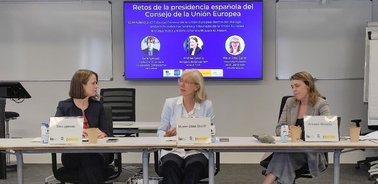- Home
- We Are Law School
- News
- The General Court Of The Eu In The Dialogue Between National Courts And Eu Courts
The General Court of the EU in the dialogue between national courts and EU Courts

The IE Center for European Studies organizes a meeting to discuss the most relevant aspects of the draft regulation of the European Parliament and of the Council amending Protocol No 3 on the Statute of the Court of Justice of the European Union.
On October 18th, IE Law School hosted the seminar ‘The General Court of the EU in the dialogue between national courts and EU Courts’. Organized by the IE Center for European Studies, it is sponsored by the 'Hablamos de Europa' program, of the Secretary of State for the European Union, under the Ministry of Foreign Affairs, European Union and Cooperation of Spain.
The event, moderated by Marie-José Garot, Director of the IE Center for European Studies and Associate Professor at IE Law School, was attended by two experts on the subject: Sara Iglesias, Professor at the Complutense University of Madrid; and Andrea Gavela, Chief State Counsel at the Court of Justice of the European Union (CJEU).
The CJEU is one of the EU’s seven institutions. It consists of two courts of law: the Court of Justice proper and the General Court. It is responsible for the jurisdiction of the European Union. The courts ensure the correct interpretation and application of primary and secondary EU law in the EU. They review the legality of acts of the EU institutions and decide whether Member States have fulfilled their obligations under primary and secondary law. The Court of Justice also provides interpretations of EU law when so requested by national judges.
The seminar focused on the challenges posed by the draft regulation of the European Parliament and of the Council amending Protocol No 3 on the Statute of the Court of Justice of the European Union by proposing that the General Court may hear preliminary rulings in certain areas. The two speakers focused on the issues raised by the reform, in particular as regards the uniform application of Union law, as well as on the legislative procedure underway to adopt it.
